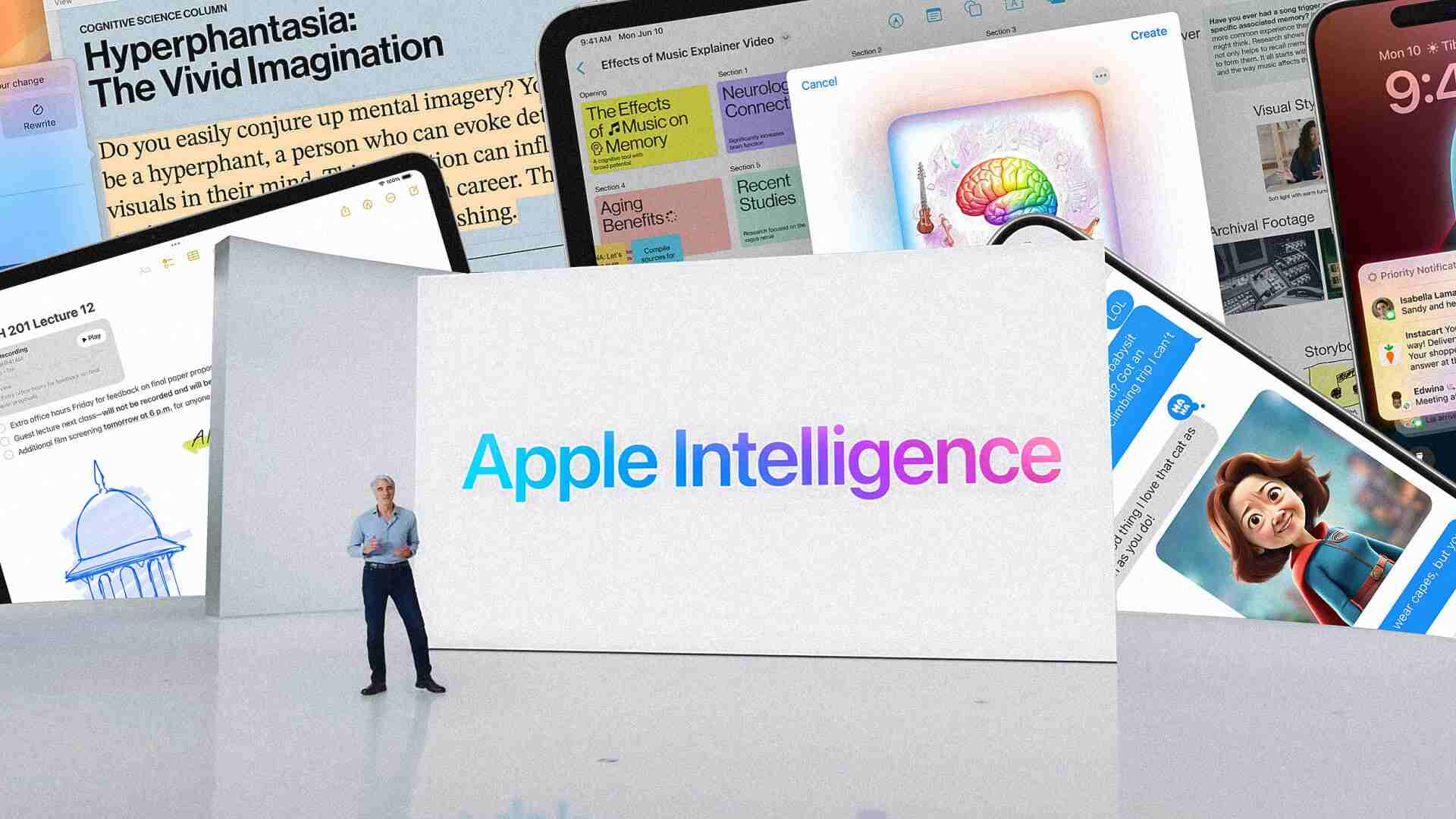- | 8:00 am
Apple just took AI and cleverly rebranded it as its own
Never mind that Apple is late to the AI scene. AI stands for ‘Apple Intelligence’ now.

Apple’s announcement at this week’s Worldwide Development Conference of various forthcoming artificial-intelligence-driven capabilities for the iPhone—under the banner of what it dubbed Apple Intelligence—struck many observers as fairly belated, and rather underwhelming. Its competitors also got in some jabs: “Adding ‘Apple’ doesn’t make it new or groundbreaking,” the @SamsungMobileUS snarked on X. “Welcome to AI 🍎.”
That’s a fair point. Apple simply hijacking the abbreviation AI for itself, and replacing the generic “artificial intelligence” with the branded “Apple Intelligence,” is not a substantial gesture. But as a branding maneuver to distinguish itself in the noisy marketplace of AI dreams and promises, pulling the term Apple Intelligence out of thin air and pretending it represents a considered point of view is not a bad move. It simultaneously suggests Apple is above the sometimes-dubious AI fray, and yet somehow owns the entire space. It may not really be all that intelligent, but it’s a remarkable mix of caution and chutzpah that may turn out to be a solid example of Apple Cunning.
Apple has been widely perceived as an AI laggard since the great acceleration of generative AI hype sparked by OpenAI’s ChatGPT is a couple of years old. Siri, once positioned as a cutting-edge precursor to personalized AI assistance, has been around for more than a decade, mostly treading water. So for starters, the borderline-overcompensating new term sends a signal that Apple is taking this seriously.
The Apple Intelligence version of Siri will have more of a memory, and draw knowledge from iPhone app usage. Making use of large-language model technology, it should better and understand and more fluently respond to queries in everyday language. The most widely repeated example from the WWDC presentation involved pulling together flight information, map and location data, and details of plans made via text.
Again, not mind-blowing. But relatable: Apple Intelligence feels like more of an infusion into the existing iPhone experience than a revolutionary reinvention. That may be closer to how consumers are really experiencing AI—and that may prove a useful approach. In past public pronouncements, Apple has leaned more on terms like “machine learning,” as if to steer clear of appearing to chase the AI-buzz bandwagon. Even in this unveiling, Apple execs seldom used the term AI, except to essentially co-opt it by declaring Apple Intelligence “AI for the rest of us.”
Microsoft, Google, and others have already been integrating AI technology into existing products and features. But they haven’t branded that undertaking as neatly Apple Intelligence seeks to do. The positioning arguably gives Apple a new story to tell its customers.
The new scheme also includes a deal with OpenAI that allows Apple’s system to direct users to ChatGPT for more complex queries or directives. This provides a bit of a layer between Apple and any ChatGPT hallucinations or other hijinks. But it also essentially tucks ChatGPT into a role as a kind of subservient component of Apple Intelligence—one that can, presumably, be replaced if Apple comes to prefer an alternative, or to build one itself.
Broadly, Apple Intelligence is positioned as taking a more personalized yet privacy-minded approach—consistent with the general image the company has cultivated for years. It evokes not just to edgy technology, but to an approach to edgy technology.
With more than a billion iPhone users, it’s both well-positioned to be cautious, and arguably needs to be cautious. So far, the most aggressive critique of Apple Intelligence has come from Elon Musk, whose ventures include an AI company: If Apple integrates OpenAI “at the OS level,” he will ban its devices from his companies. Probably Apple can live with that. As a branding move, Apple Intelligence speaks to a potential majority of customers who would rather see the iPhone improved than replaced (or supplemented) with a different gizmo. And over time, taking full advantage of most of these new AI features will, of course, require a new iPhone. If a little branding daring can add enough AI sheen to keep those customers coming back, Apple will end up looking pretty clever. Welcome to AI 🍎.







































